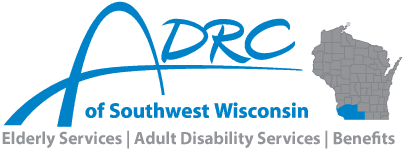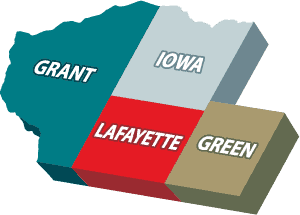What is an ADRC? The Place for Information and Assistance!
Aging and Disability Resource Centers (ADRCs) are the first place to go to get accurate, unbiased information on all aspects of life related to aging or living with a disability; a little known fact is that every county in the state of Wisconsin has one! ADRCs are friendly, welcoming places where anyone – individuals, concerned families or friends, or professionals working with issues related to aging or disabilities – can go for information tailored to their situation. The ADRC provides information on broad range of programs and services, helps people understand the various long term care options available to them, helps people apply for programs and benefits, and serves as an access point for publicly-funded long term care. These services can be provided at the ADRC, via telephone, or through a home visit, whichever is most convenient for the individual seeking help.
An Aging and Disability Resource Center proved the following services an more:
Information and Assistance:
- +Information about local services and resources
- +Assistance in finding services that match your needs:
- +In-home care
- +Housekeeping and chore services
- +Home modifications, safety, or maintenance
- +Health (healthy lifestyles, management of chronic conditions, dementia, etc)
- +Respite (temporary relief for family caregivers)
- +Transportation
- +Nutrition, home delivered meals
- +Housing, including senior and low income housing
- +Assisted Living, nursing homes, and other long term care facilities
- +Financial assistance (e.g. Social Security, SSI, Medicare, Medicaid, and other benefit programs)
- +Legal issues (guardianship, power of attorney, client right advocacy)
- +Abuse, neglect, financial exploitation
- +Mental health, alcohol and drug abuse, crisis intervention
- +Employment, vocational services, volunteer work
- +Adaptive equipment
Dementia Care Specialist
For You…
- Visit one-on-one to help support individuals living with dementia, their family and friends.
- Support individuals by discussing caregiving techniques, coping strategies, future planning needs, resources, programs, etc.
- Offer Memory Screens to help identify changes in cognition that can help facilitate a follow up with the individual’s primary care provider or a memory diagnostic clinic
- Facilitate programs such as LEEPS for individuals living with memory loss, Alzheimer’s, or other dementias. This program helps engage individuals physically, socially, and mentally.
- Implement Memory Care Connections. An evidenced-based program used to help facilitate family/group discussions to help support the primary caregiver so they in-turn can best support the individual with dementia.
For Your Community…
- Be a catalyst in the creation of Dementia Friendly Communities, which aims to help increase the awareness and understanding of dementia to decrease stigma and isolation. We want individuals with dementia feel included and supported in their community. It includes educating:
- Businesses such as banks, restaurants, grocery stores, pharmacy, shops, etc.
- Organizations such as Optimists, Kiwanis, Women’s Groups, Rotary Clubs, etc.
- Libraries and Senior Centers
- First Responders, Police Departments, EMS
- Faith Communities
- Younger Generations
- Offer the Virtual Dementia Tour® which is an experiential training designed to help individuals have a better understanding of what it may be like to live with dementia. The simulation opportunity includes putting on “equipment” and participating in an interactive learning experience. It will help increase your empathy and awareness related to dementia.
Long Term Care Options Counseling:
- +The ADRC can determine if you will be eligible for public funding for your long term care.
- +The ADRC can help you prepare your Medicaid application, if eligible.
- +Information about the choices you have when making decision about where to live, waht kind of help you need, where to receive that care and help, and how to pay for it.
- +One-on-one consultation to help you think through the pros and cons of the various options in the light of your situation, values, resources, and preferences.
- +Information about Wisconsin’s long term care programs and help connect you to resources in your area.
Benefit Specialists:
+Benefit specialists can help answer questions and solve problems related to benefits such as Medicare, Medicaid, Social Security, FoodShare, and private health insurance.
Health and Wellness:
+The ADRC can connect you to wellness programs to help keep you healthy and independent.

